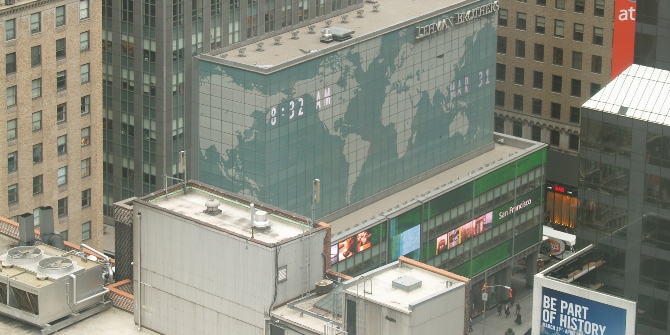“The fourth industrial revolution – isn’t that an IT thing? We have a Minister for Digital looking at it”, said a policymaker. “Yes, it is changing business models which is why we are fostering an ecosystem for start-up innovation”, said another minister.
The implications of the current wave of technological change at a mechanical and commercial level are fairly well-understood. Policymakers and businesses are rightly focused on harnessing digital technology for better delivery of public services or enhancement of their competitive advantage. Interventions are typically at the micro-level, service by service, business by business.
What is often overlooked are the macroeconomic and social policy implications at a structural level.
There is hardly any acknowledgement that both the levers of macroeconomic policy (interest rates, taxation, public spending) and the framework of debate (on a traditional left-right spectrum) are in rapid need of redesign. Most macroeconomic aggregates such as growth, inflation, trade, capital expenditure, productivity and money supply are currently in a state of flux, the reasons for which are not completely understood. Not enough is being done to extrapolate from the world of micro to that of macro.
What does it mean at a macroeconomic level when a company with 55 employees can be acquired for 20 billion dollars? What does it mean for industrial relations when a privately-owned artificial intelligence product can learn all that there is to know about chess (and defeat the reining world champion) in just four hours? What does it mean for infrastructure investments and shopping malls when I do virtually all of my shopping using Amazon Prime? What does it mean for ‘manpower exports’ from South Asia when Dubai builds an entire office building using 3-D printing and appoints the world’s first Minister for Artificial Intelligence? What does it mean for inflation and productivity estimates when tools of communication are almost free at the point of usage?
Today, the top six of the largest companies in the world are ‘platform companies’: Apple, Google (Alphabet), Microsoft, Amazon, Facebook and Alibaba. The top four have greater market value than the top 12 banks worldwide. While we are in the midst of a technology revolution – characterised by extreme automation and extreme connectivity with rapid feedback loops – its implications reach way farther than the current reach of technology.
It’s not just “robots with artificial intelligence” that can develop skills previously only humans possessed. It’s ‘cobots’ collaborating with each other, manning an entire factory. Or the Internet of Things where my fridge places an order for milk even before I realise that I have run out. That milk will either be delivered by drone or by a driver-less car.
Uber and AirBnB are emblematic of the fact that many industrial factors of production are now accessible to you and me in smaller units of usage. Together with low-cost connectivity and data analytics, we can challenge established business models. In fact, in many cases, we can challenge the ‘theory of the firm’ that earned Ronald Coase his Nobel prize.
Uberisation is accompanied by ‘servicification’ of manufacturing. (I apologise for these horrible nouns). I will probably not buy another car as a product if I know that you will provide me with transportation services using spare capacity in your existing car. At a macro level, spare capacity means low investment and companies can either sit on cash or buy their stock back.
3-D Printing and AI-driven robotics might also be shortening supply-chains, bringing back (‘reshoring’) labour-intensive manufacturing to the west. As reported in the World Bank publication “Trouble in the Making?”, Philips shavers in the Netherlands and Adidas shoes in Germany have apparently done that, bringing down unit cost of production in each case. At a macro level, this could slow down international trade in tangible goods.
The fourth industrial revolution presents us with an incredible paradox: In aggregate, we are witnessing the rapid unfolding of technology that has the power to give everyone, virtually everything that we need around the globe. In aggregate – across health, education, food and energy – we have the technology to usher in the age of sustainable abundance virtually for free.
The problem however, is not in the aggregate. It is in the distribution of benefits. We face a massive leadership and coordination challenge that can snatch defeat from the jaws of victory. If it is left to its own device and subject to our current systems of governance, this revolution is not only disruptive but it is structurally polarising in an exponential manner. By default and without active re-shaping, it exacerbates inequalities and concentrates economic surplus in fewer hands.
In macroeconomic terms, those fewer hands have a lower marginal propensity to consume, keeping overall growth rates subdued. Arguably, they will deploy much of their money in the stock markets, driving up asset bubbles, bringing down potential yields, distorting systems of public finance and pensions.
So what can be done?
Firstly, in our policy and public discourse, we need to acknowledge the change in our backdrop with greater honesty and clarity. It is not possible to keep pace with exponential change with linear responses. It is not possible to keep pace with felt experiences of citizens with stale conceptual analysis.
Secondly, everything should be open for debate and potential re-design, including sacred cows. In the UK, two-thirds of National Health Service trusts are in deficit. Pension plans are in deficit almost everywhere in the world. There is probably no scenario in which these will return to surplus, without root-and-branch changes.
Thirdly, countries need to do ‘the vision thing’. We need to articulate our desired end-state and work backwards from them. Singapore’s governing mantra of “think ahead, think across and think again” is effected through articulating and updating its broad direction of travel. By contrast, national discourse in the UK can be dominated by incremental, piecemeal measures (for example, around police numbers or hospital beds). It is a marvel that the entire debate around Brexit was conducted without reference to a steady-state vision and what it means for stakeholders within it.
Fourth, we must approach each dimension of the challenge as a system – system by system. The United Nations put forward 17 sustainable development goals (SDGs) that countries and corporations can use as yardstick. The World Economic Forum has articulated 14 systems, each one of which provides a unique point of entry and the ability to trace linkages through transformation maps. Fresh, creative thinking from multiple stakeholders can emerge from these systemic approaches.
For example, the council on Long-term Investing, Infrastructure and Development (of which I am a member) addresses the behavioural and institutional blockages that prevent funds from flowing into infrastructure and other socially impactful investments from private, public and blended sources. It explores creative solutions such as asset-recycling and connects with the wider question of the purpose of finance.
Fifth, we need a clearing mechanism for conflict. How we engage in constructive conflict and how proactively we seek out diversity will help us avert blind-spots and rise above the ‘false binary’ of Westminister-style debate. It is not capitalism versus socialism; it is liberalising labour markets and intervenionist policy around training and transition. It is deeper capital markets and better regulation, governance and boardroom accountability. It is meritocracy and social mobility. Navigating disagreement between genuinely held beliefs is the hallmark of leadership.
It is high time that the full import of the fourth industrial revolution is brought out of the niche domains of technology and business. It must directly inform policy at a macroeconomic level.
♣♣♣
Notes:
- This blog post is based on the author’s contribution at the 50th anniversary celebration of the Centre for International Studies, LSE.
- The post gives the views of its authors, not the position of LSE Business Review or the London School of Economics.
- Featured image credit: Earth, by TheDigitalArtist, under a CC0 licence
- When you leave a comment, you’re agreeing to our Comment Policy.






Thanks helena for the information on fourth revolution of Industrial, this can help millions of people to get recovered from the job crisis
Hi James, The blog had defaulted into showing the editor’s name, but I have just fixed it to show the name of the author, Lutfey Siddiqi. Thanks!